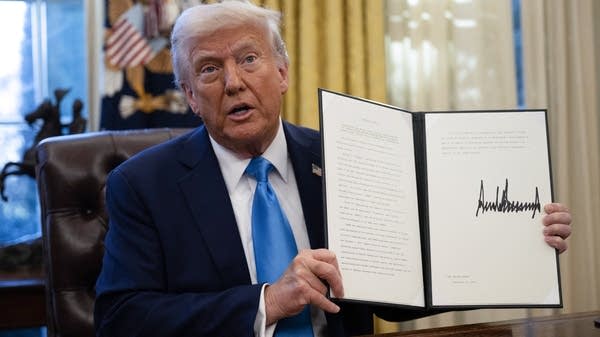How federal funding cuts are affecting cancer research at Duke University
Research at a Duke University laboratory led to a new breast cancer drug in 2023. Government funding for that lab is now in limbo.

The Trump administration’s budget-cutting efforts are having a big impact at research universities, even as those efforts remain in various stages of implementation due to legal challenges. Universities have to plan years ahead, especially when it comes to medical research. And dozens of institutions have announced cuts.
Research that started 30 years ago at Donald McDonnell’s laboratory at Duke University led to a new drug in 2023 to treat metastatic breast cancer. Now, he has a second drug in clinical trials.
“Both of those drugs — let me just say — were drugs that industry passed on years and years ago for other indications, and they were rediscovered by really inquisitive, bright graduate students,” he said.
McDonnell’s lab depends on a handful of those students, funded in part through the school and in part through grants. Right now, with all of the uncertainty around federal funding, McDonnell is facing an unprecedented challenge.
“This is the time of year when students elect, you know, to work with various professors, and I personally am scrambling right now to take four incredible students who want to work with me to develop a new drug we have for prostate cancer, and I can’t find funding,” he said.
He needs $70,000 per student per year.
Similar scenes are playing out across the country. Academics say that at minimum, the Trump administration is slow-walking approvals of medical research grants.
Also, the threat of drastically reducing reimbursement for researchers’ so-called indirect costs — things like electricity and supplies — has left many unsure about what money their labs will actually have to spend.
“We’re doing a lot of tabletop exercises, a lot of strategic planning exercises with different scenarios,” said Colin Duckett, executive vice dean for basic and preclinical science at Duke. Those scenarios could mean broader, school-wide budget cuts to come.
Dozens of other universities have already publicly announced such cuts, because of the disruptions coming from the federal government.
“I came here 35 years ago from England, because this is the best place in the world to do science. And it is really sad for me to wonder whether the U.S. is the best place to do science. It’s almost inconceivable,” said Laurel Harbridge-Yong, a political science professor at Northwestern University. “There is a lot of worry, there’s a lot of frustration, there is a lot of anxiety.”
Harbridge-Yong’s own research grants are unaffected, but she’s been having a lot of conversations across academia. She noted that graduate students, in particular, are concerned about their futures.
That’s because of the challenges professors like McDonnell are having in finding grants. Existing private funds can’t make up the difference for the federal government’s vast financial powers.
“If this grant money dramatically decreases or goes away in some fields, we can’t sustain to bring in the graduate students,” Harbridge-Yong said. “That means these early career researchers don’t get to be trained to become world-class researchers and scientists, and we’re going to lose that whole pipeline of expertise and knowledge.”
It’s the kind of loss, academics say, that could take a decade or more to reverse.







